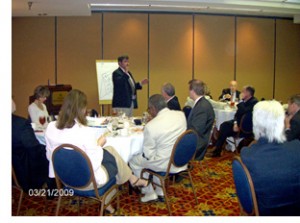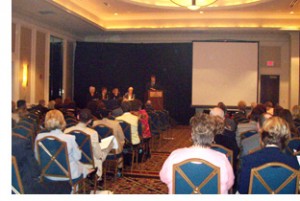Tuesday, April 21, 2009 – 8:30am to 11:30am Nashville Hilton Downtown
On April 21, more than 100 educators and community leaders gathered in Nashville to discuss how effective early childhood education can have a major impact on high school and postsecondary outcomes; the event was followed with a private briefing for legislators. Photos, PowerPoint presentations, and links to more information are provided below; streaming video of the morning meeting will be available in the next few days. Check back soon, or use this form to let us know that you’d like to be updated when it’s available.
Two bonus links: video clips of Direct Instruction in action, and a graphic showing the results of Project Follow Through, the largest federal education research initiative in US history.
The event included the following sessions:
The Link Between PreK Education and Workforce Preparedness (8:30am – 9am) Dr. John Stone, president of the Education Consumers Foundation, highlighted the clear connection between effective early childhood education, an improvement in K-12 outcomes, and a better-prepared workforce for Tennessee. Participants interested in this discussion may wish to review the following links:
- Video of Dr. Stone’s presentation
- Dr. Stone’s PowerPoint from his presentation at the event
 Getting Every Child to Grade Level in Kennewick, WA (9am – 10:30 am)
Getting Every Child to Grade Level in Kennewick, WA (9am – 10:30 am)
Our featured presenter was Lynn Fielding, chairman of the school board in Kennewick, Washington, and one of the leaders of a movement to help every child read at grade level by the third grade. In just 10 years, performance skyrocketed in the Kennewick district, going from 57% of children at grade level to 90%+, thanks to a targeted community engagement program and the use of Direct Instruction in the early school years.
Mr. Fielding, a tax attorney by trade, is the author of Annual Growth, Catch Up Growth with two of his fellow school board members. This book details their efforts to get an accurate assessment of the challenge, devise a strategy for addressing it, and build upon initial successes to create a district-wide and community-wide response to the challenges that they faced.
Fielding shared details of their work and took questions from audience members interested in pursuing similar research-based and proven strategies in Tennessee. View the following links for more:
- Video of Lynn Fielding’s presentation
- Fielding’s PowerPoint from his presentation at the event
 Making It Happen: A Panel Discussion(10:45am – 11:30am) Representatives of different constituencies – reform groups, superintendents, school boards, and the research community – participated in a panel discussion on the outlook for early childhood education funding, how to build a consensus for effective action at the community level, and how to track outcomes and make a case for sustainability and growth. Panelists included:
Making It Happen: A Panel Discussion(10:45am – 11:30am) Representatives of different constituencies – reform groups, superintendents, school boards, and the research community – participated in a panel discussion on the outlook for early childhood education funding, how to build a consensus for effective action at the community level, and how to track outcomes and make a case for sustainability and growth. Panelists included:
- Dr. Tammy Grissom, Executive Director,Tennessee School Boards Association
- Brad Smith, Executive Director,Tennessee SCORE
- Dr. Kathleen Airhart, Director of Schools, Putnam County Schools
- Dr. Kathleen Madigan, Senior Research Scientist, AccountabilityWorks
If you are interested in learning more about Direct Instruction (the approach used in Kennewick), Mr. Fielding’s READY foundation, or about other issues relevant to this discussion, you can explore the links below for more information.
- READY! for Kindergarten website
- ECF Presentation at TSBA 2008 meeting
- Annual Growth, Catch-Up Growth
- Kindergarten Learning Gap
- Pre-K Can Work
- Kennewick’s Maxims of Achievement and Growth
- Comprehensive School Reform Quality Comparative Report
- CSRQ Center Report on Elementary School Comprehensive School Reform Models
- Direct Instruction in Gering, NE
- Stossel on Direct Instruction
- Follow Through: Why Didn’t We
- Effective Schools, Common Practices
- Resisting Education’s Fads
- Learning Free Zones: Five Reasons America’s Schools Won’t Improve
- Buyers and Sellers of Education Research
- Diploma to Nowhere
- US Chamber’s Leaders and Laggards Report
To get a more complete sense of what the Education Consumers Foundation can offer to education consumers and their chosen representatives, please take the time to cycle through the menu items at the top of the page. They represent the foundation’s primary areas of focus, and include:
- The Tennessee Project – Details on the foundation’s work with value-added assessment data in Tennessee, including our Value-Added Achievement Awards, School Performance Charts, a report on the common practices of effective schools, analysis of value-added data, and much more
- Research and Insight – Published works from the Foundation along the lines of articles found in the starter pack above
- The Education Consumers Consultants Network – Assistance finding experts who can help address your particular challenges
- About the ECF – Background information on the foundation: who we are, what we do, and how to support our efforts
If you have any questions or comments, please feel free to contact us through our contact page; a representative of the foundation will contact you shortly.
